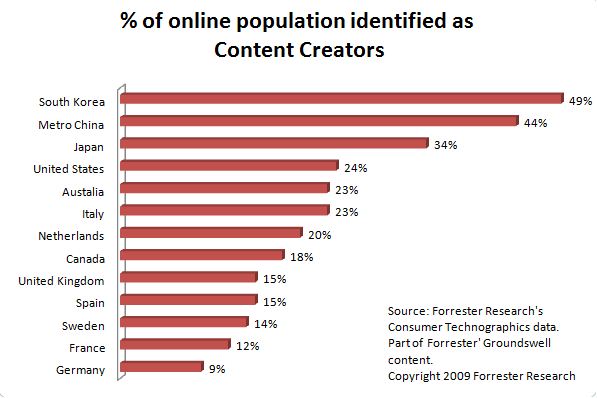Is our view of the world distorted by the uneven distribution of content creators? And for those countries and groups who lag in creating content, do they risk invisibility and marginalization?
Social media has enabled anyone with access to the Internet to create and share content. And this makes it possible for us to see the world as we have never seen it before. Not through the eyes of elites, but through the eyes of ordinary people like you and me.
But there’s a problem. Some parts of the world are more visible than others. And some areas risk being marginalized.
There are significant variations in the rate at which people from different countries participate in the act of content creation. And the countries with the highest levels of participation may not be the ones you expect.
The Forrester Social Technographics country profiles vividly illustrate this issue. Forrester’s Social Technographics profiles demonstrate that people participate in social media in a range of ways and with varying degrees of engagement, from simply consuming through to actively creating content.
When you compare Technographics profiles on a national basis, a “content creation gap” can be seen between the most prolific content creators and the laggards. Most important is the proportion of the online population who self identify as Content Creators, the top rung of the Technographics ladder.
There’s a huge gap between the leaders and the laggards – ranging from over one third of people online creating content in South Korea, Metro China, Japan to less than one in five people creating content in countries like Canada, the UK, Spain and Sweden. And barely one in ten people who use social media in France and Germany create content.
Add to this the impact of search engine algorithms. Search engines return results that reflect content that is most popular, most linked to, and most read. That favours the most popular creators. It also favours those countries and regions that are most populous, most connected, and most prolific.
What happens to those creators who come from smaller countries and who reflect a more distinct perspective? Will they be found or will they be relegated to page 200 of the search results? A place that guarantees invisibility.
Should countries like Canada or the UK be concerned that the number of active content creators isn’t higher? Especially given that the means of content creation are accessible for free to anyone with a broadband connection?
Do we accept that 20% of people will create 80% of the content and that’s just the way things are?
Or by doing nothing, do we run the risk of losing sight of ourselves as other more prolific content creating countries generate ever more content?

